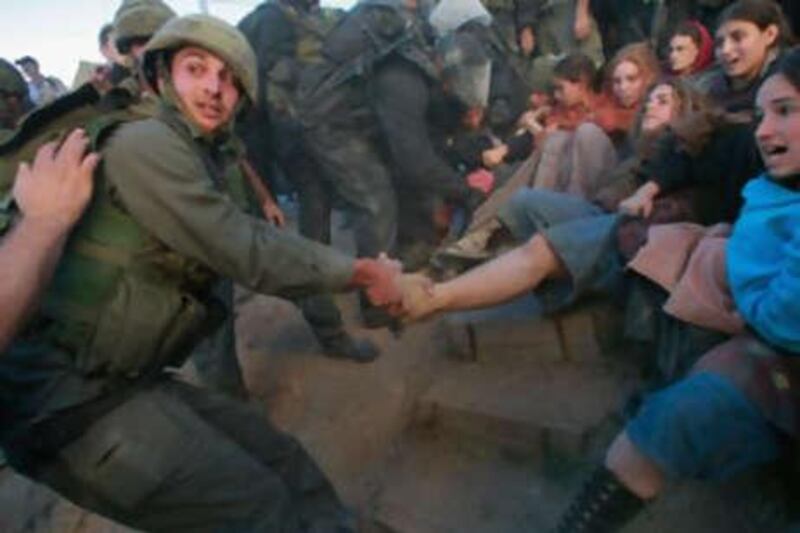NAZARETH // Extremist settler groups involved in violent confrontations with Palestinians in the centre of Hebron have chosen their next battleground, this time outside the West Bank. A far-right group know as the Jewish National Front, closely associated with the Hebron settlers, is preparing to march through one of the main Arab towns in northern Israel. The march, approved by the Supreme Court in October, is scheduled to take place on Dec 15, the group announced this week.
The police are expecting to deploy thousands of officers to prevent trouble, and have limited the number of Front members participating to 100. The march will not enter the heart of the city, police said, though it is not yet clear whether Front members will be allowed to carry the guns most have been issued as settlers. The Front said it will wave Israeli flags in what the group has dubbed a demonstration of "Jewish Pride" through Umm al Fahm, home to nearly 45,000 Palestinian citizens of Israel.
The Front's main platform is the expulsion of all Palestinians from what it calls "Greater Israel", which also includes the West Bank and Gaza. It skates close to illegality with veiled suggestions that Palestinian citizens of Israel should also be ethnically cleansed. "We will march through Umm al Fahm with flags to send everyone a message that the land of Israel belongs to us," said Baruch Marzel, the Front's leader.
The move has aroused opposition from local residents and the leadership of the Palestinian minority. Jamal Zahalka, an Arab member of parliament, called the court decision a "legitimisation of racism". "We will use our right of protest and defend Umm al Fahm from these fascists and racists." It is not the first time that Umm al Fahm has attracted the interest of Israel's far-right. The Kach party - led by Rabbi Meir Kahane - held a similar march in 1984, the year it won representation in the Israeli parliament for the first time. A decade later, the movement, which organised attacks on Palestinians, was outlawed as a terrorist group.
However, the banning of Kach has not been enforced. Several former Kach leaders, including Mr Marzel, himself a Hebron settler, have reinvented the group as the Jewish National Front. Mr Marzel has made several unsuccessful attempts to stand for parliament, and is due to run again in February. The march through Umm al Fahm is partly intended as an election ploy, according to Jafar Farah, of the Arab political lobby group Mossawa.
"The actions of the settlers from Hebron have not been generally popular with Israeli Jews. Through this provocation in Umm al Fahm, the Front hopes that it can win greater sympathy from the public." Mr Marzel has conducted similar stunts before against Palestinian citizens, who constitute a fifth of the Israeli population. His supporters have marched in the Arab town of Sakhnin in the Galilee and through an Arab neighbourhood of the "mixed city" of Jaffa.
But Mr Farah believes Umm al Fahm has been chosen this time because it can be more easily marketed as an "enemy city". In recent years, the town has gained a wide notoriety among the Jewish public. Its residents angrily took to the streets in Oct 2000 to protest the early stages of the army's crushing of the second Palestinian intifada. Clashes with police led to three local residents being shot dead.
Located in an area known as the Little Triangle, a narrow strip hugging the north-west corner of the West Bank, the town was once seen - before the construction of the separation wall - as the gateway for suicide bombers from Jenin. Its Muslim population has successfully resisted official attempts by the state to "Judaise" the area by bringing Jews to settle it, as has occurred elsewhere in the country.
Politicians, who regularly refer to the Little Triangle as a threat to the country's Jewishness, have been devising ways to transfer the area's quarter of a million inhabitants to the other side of separation wall in a land swap. Umm al Fahm is also the base of the radical wing of Israel's Islamic Movement. Its leader, Sheikh Raed Salah, a resident of Umm al Fahm, has earned especial loathing from many Israeli Jews for his campaign to protect Jerusalem's Al Aqsa mosque from Israeli plans to tighten its grip on the Old City.
Last week, in a rally in Nazareth against government policy in Gaza, the outspoken Sheikh Salah called cabinet ministers "murderers" engaged in "war crimes". "The people of Umm al Fahm resisted Kahane's march more than 20 years ago," Mr Farah said. "Marzel expects that, if there is a clash between the marchers and local people, the police will turn on the residents of Umm al Fahm again. He can then portray his group as the victims of Arab brutality."
The Front appears to have additional goals. It hopes to weaken the authority of the Supreme Court, which is much hated by the far-right because it is seen as curbing the excesses of the settler movement. During the hearing, the Front drew parallels between its right to march in Umm al Fahm and earlier court decisions protecting the right of Israeli activists to demonstrate in Hebron against the settlers. Both were a question of freedom of expression, the Front argued.
"If [the judges] do not approve our petition, it will cause serious damage to the public's trust in the courts and will send the message that what is OK for Arabs and leftists is forbidden for us," said Itimar Ben-Gvir, another Front leader. In a possible sign of the court's intimidation, the judges ignored recommendations from both the police and Shin Bet security service to ban the march because it could spark widespread violence between Jews and Arabs, especially in the wake of the recent inter-communal clashes in the town of Acre.
@Email:jcook@thenational.ae






